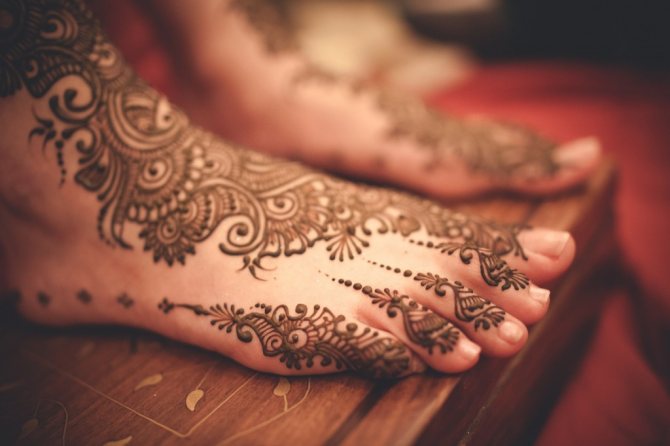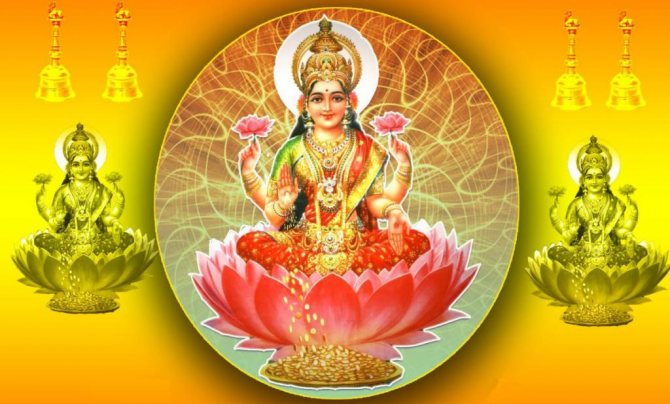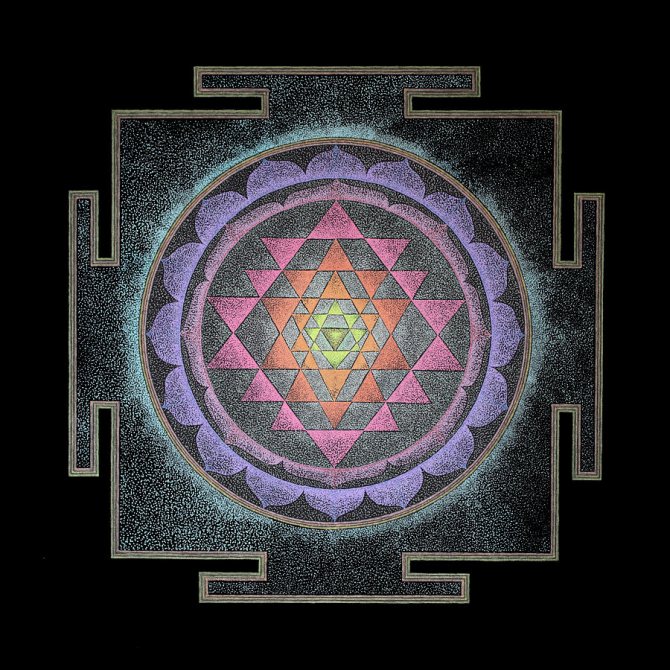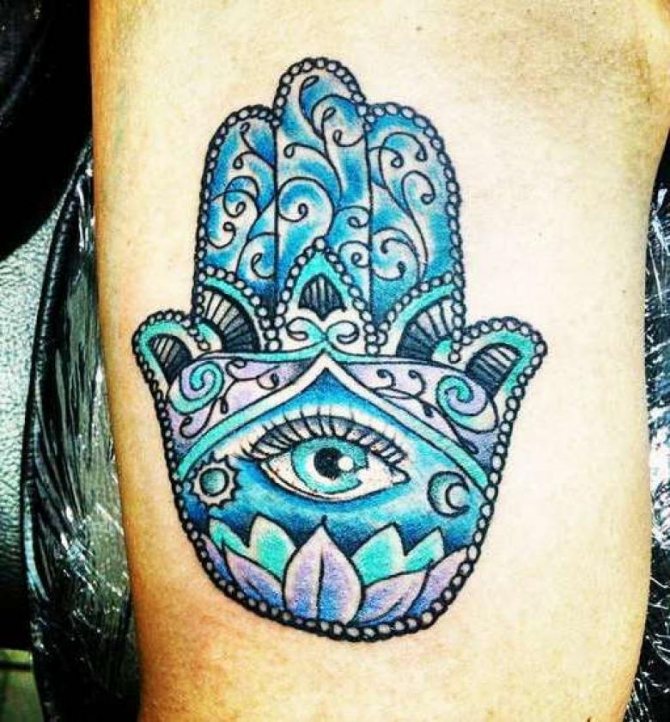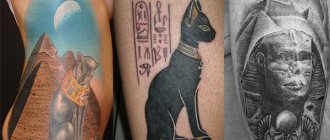The Hindu Faith, originating in India, is one of the oldest known religions in the world with some historians believing that man began practicing Hinduism around 500bc. Today, it continues to be the major religion and is considered the 3rd largest in the entire world.
Hindus believe in many gods, goddesses and deities, and over time this has produced incredible images. Vividly colorful images of these many gods appear in paintings, sculptures and adorn religious text.
For the Hindu who loves body art (and sometimes even those who do not practice their faith) these gods and deities exclude tattoo subjects rich in meaning.
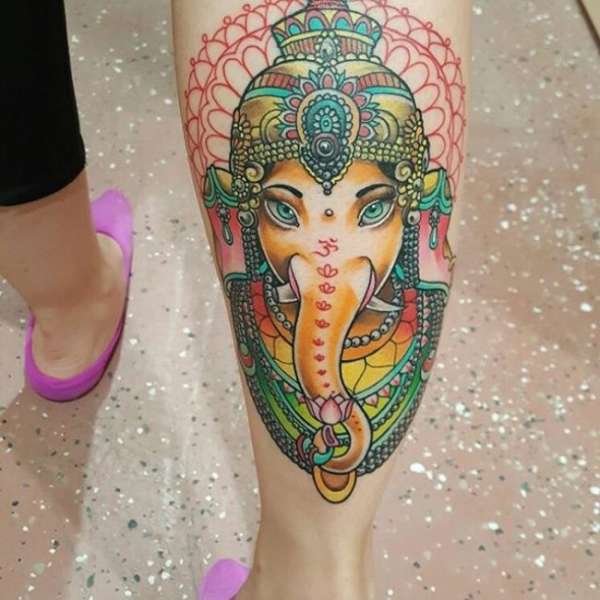
Those who practice Hinduism are exceptionally devoted to their faith and dedicated to its teachings and precepts. The themes of this religion include duty, diligence, patience and restraint, to name just a few.
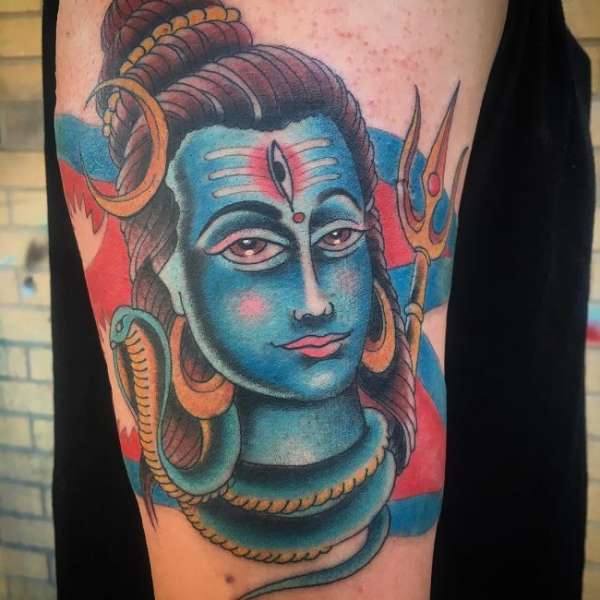

Matriarchy in the world of tattoos.
India, the only country where tattooing was seen as a sign of beauty and therefore was originally considered an exclusively female prerogative. The first body paintings were found on the skin of Indian beauties who lived several thousand years ago. The fashion of that time included the decoration of the body, hands and even face.
Only noble ladies could afford to decorate their bodies with patterns. This is explained by the fact that Indian women sought to identify themselves with the wife of the god Krishna, who is considered the ancestor of tattoos. The tattoo, in a sense, was supposed to emphasize the extraterrestrial purpose of the beauty.
Men's tattoos also existed. They were applied mainly on the back and served to define the class.
Meaning of tattoos
Different types of tattoos for women and men had different meanings.


However, tattoos were considered more of a sign of beauty, so tattoos were much more common on women.
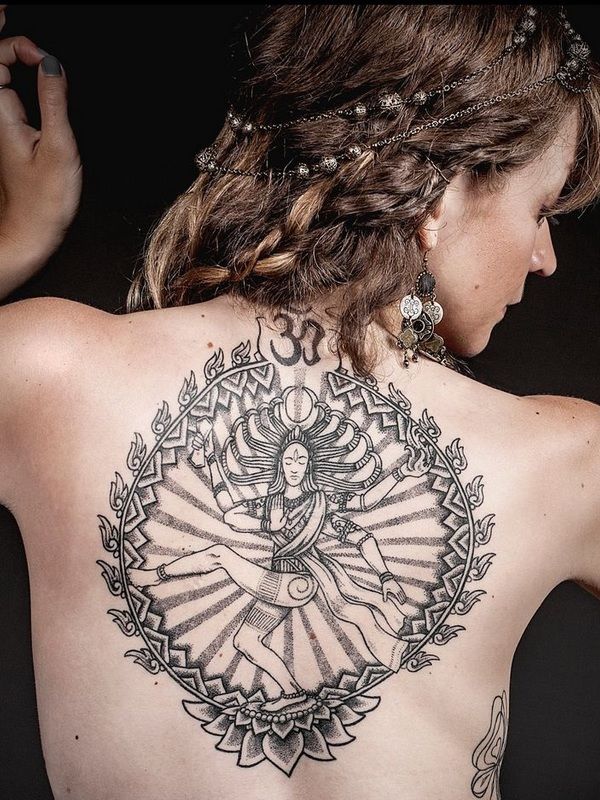

Tattoos were also used to protect the wearer from the evil eye and other evils. Many people only use tattoos as a symbol of Indian culture, but every tattoo has meaning. Some tattoos are believed to be able to protect the wearer even in the afterlife.
Traditional Indian Tattoos.
Since ancient times, Indian tattoos have had a hidden meaning. They were meant to protect their bearers, attract good luck and help them find a spiritual balance. The secrets of tattooing were in every family. They have been perfected and handed down from generation to generation, evolving into a recognizable clan painting.
Mendi (mehendi) and tilaka are considered the most popular and widespread techniques in India. Tattoo mehendi is a painting of the body with liquid henna. The technique originates in ancient times and for the first time was used in wedding ceremonies, when brides were getting ready. The main motifs of mehendi are still plant motifs symbolizing the vitality and fertility.
Unlike mendi, talaqa has a deeper spiritual meaning. The images are painted on the skin with red clay, ash, or sacred oil. The drawings in this technique are more cumbersome and laconic. A striking example of tilaka is the bindi, a red dot on the forehead of Indian women.
Hymn to the great conqueror of death (mahamritiunjaya stotra)
॥ महामृत्युञ्जयस्तोत्रम् ॥
रुद्रं पशुपतिं स्थाणुं नीलकण्ठमुमापतिम् । नमामि शिरसा देवं किं नो मृत्युः कर करिष्12 ॥ १ ॥
Lord of souls and axis of all, Dark whose neck is dark, fearful howl What can death do to him who has honored God with a serpent?
नीलकन्ठं कालमूर्त्तिं कालज्ञं कालनाशनम् । नमामि शिरसा देवं कि02 नो मृत्10 कर करिष्यत ॥ २ ॥
The dark-hearted God, death itself, Of time who destroys the swarm What can death do to him who has honored God with a serpent?
नीलकण्ठं विरूपाक्शं निर्मलं नि05्रदम् । नमामि शिरसा देवं किं ो मृत्युः कर करिष्13 ॥ ३ ॥
The other-eyed one, blood to all, Precious, and throat with blue What can death do to him who has honored God with a serpent?
वामदेवं महादेवं लोकनाथं जगद्गुरुम् । नमामि शिरसा देवं किं नो मृत्युः करिष्यत ॥ ४ ॥
Who is beyond anything, Master of the world, dear What can death do to him who has honored God with a serpent?
देवदेवं जगन्नाथं देवेशं वृषभध्वजम् । नमामि शिरसा देवं किंनो मृत्युः करिष्यति ॥ ५ ॥
All gods are servants only to whom, Whose symbol is the bull, king of the world What can death do to him who has honored God with a serpent?
त्र्यक्शं चतुर्भुजं शान्तं जटामकुटधारिणम् । नमामि शिरसा देवं किं नो मृत्युः करिषयत ॥ ६ ॥
Three-armed, whose tresses are in a mop, Four-armed, himself at peace What can death do to him who has honored God with a serpent?
भस्मोद्धूलितसर्वाङ्गं नागाभरणभूषितम् । नमामि शिरसा देवं किं नो मृत्11 करिष्यत ॥ ७ ॥
Wearing serpents and the moon, Covered with ashes and ashes What can death do to him who has honored God with a serpent?
अनन्तमव्ययं शान्तं अक्शमालाधरं हरम् । नमामि शिरसा देवं किं नो मृत्युः करिष्12 ॥ ८ ॥
Rudder, there is no end to whom, Holder of the rosary and not evil What can death do to him who has honored God with a serpent?
आनन्दं परमं नित्यं कैवल्यपददायिनम् । नमामि शिरसा देवं किं नो मृत्युः करिष्यत ९ ॥
Protector supreme who is all Blessed, singular in himself What can death do to one who has honored God with a serpent?
अर्द्धनारीश्वरं देवं पार्वतीप्राणनायकम् । नमाम शिरसा देवं किं नो मृत्09 कर करिष्11 ॥ १० ॥
The fit husband and wife Spouse of the Goddess and hero What can death do to him who has honored God with a serpent?
प्रलयस्थितिकर्01्तारमादकर्त्तारमीश्वरम् । नमाम शिरसा देवं किं क ो मृत्10 करिष्यति ॥ ११॥
The Creator, no forerunner to whom, Keeps and ruins his cosmos What can death do to him who has honored God with a serpent?
व्योमकेशं विरूपाक्शं चन्द्रार्द्धकृतशेखरम् । नमामि शिरसा देवं किं नो मृत्09 करिष्11 १२ ॥
All the sky's hair to him, In which the month above the earth What can death do to him who has honored God with a serpent?
गङ्गाधरं शश धरं शङ्करं शूलपाणिनम् । नमामि शिरसा देवं किंनो मृत्10 करिष्यत ॥ १३ ॥
He who holds the Ganges and the moon, He who clutches the spear with his hand What can death do to him who has honored God with a serpent?
अनाथः परमानन्तं कैवल्यपदगामिनि । नमामि शिरसा देवं किं नो मृत्युः करिष्09 ॥ १४ ॥
Not limited, not under anyone's control; to himself What can death do to him who has honored God with a serpent?
स्वर्गापवर्गदातारं सृष्टिस्थित्यन्तकारणम् । नमामि शिरसा देवं किं ो मृत्10 कर करिष्यत ॥ १५ ॥
He who gives beginning to all things, Ends, freedoms and stays What can death do to him who has honored God with a serpent?
कल्पायुर्द्देहि मे पुण्यं यावदायुररोगताम् । नमामि शिरसा देवं किं नो मृत्युः कर करिष्यत ॥ १६ ॥
Giver, by an era of life at length Healer of disease who any What can make death do to him who has honored God with a serpent?
शिवेशानां महादेवं वामदेवं सदाश सदाशिवम् । नमामि शिरसा देवं किंनो मृत्युः करिष्यति ॥ १७ ॥
Gods lord, destroyer of darkness Beautiful god, always good What can death do to him who has honored God with a serpent?
उत्पत्तिस्थतिसंहारकर्तारमीश्वरं गुरुम् । नमाम शि रसा देवं किं ो मृत युः कर कर यत ॥ १८ ॥
Who is the teacher of the world to all, Who has revealed all cycles with Himself What can death do to him who has honored God with a serpent?
Variants of sketches.
Although images made by henna are considered traditional, in the modern world Indian tattoo sketches are presented in great variety and are worthy competition to many style trends. The most common are:
- Ancient Gods: Shiva, Ganesha, Krishna, multi-armed Kali, Vishnu, Brahma, Lakshmi and others;
- OM Mantra. Indians believe that this sound came to earth by traversing the vastness of the universe;
- Mandala. Today there are a great many varieties of this element, but the meaning of the mandala tattoo remains the same: purification, harmony, connection with the cosmic forces;
- Hamsa, or the hand of God. Sometimes it is supplemented by an open eye in the center of the palm;
- Lotus. Solo or paired with a deity. It is one of the most positive symbols, giving peace and prosperity;
- Dreamcatcher. A very popular and spectacular tattoo, in addition protecting against evil spirits;
- Peacock Feather (or Firebird) is considered one of the incarnations of Buddha. Nabituyut such a tattoo to attract happiness;
- The Indian cucumber, also one of the popular ethnic patterns. In addition to its aesthetic component, it becomes a talisman that attracts good luck and prosperity.
Any Indian tattoo is a talisman that protects its owner and gives him the blessing of the ancient gods.
Shiva shadakshara stotra
।। शिव षडक्षर स्तोत्रम् ।।
ॐकारं बिन्दु संयुक्तं नित्यं ध्यायन्त योगिनः । कामदं मोक्षदं चैव ॐकाराय नमो नमः ।। १ ।।
With the primal point one, With the mind of the yogi forever seen, Wishes, wills it gives bowing to the word "ohm". (ॐ)
नमन्ति ऋषयो देवा नमन्त्यप्सरसां गणाः । नरा नमन्ति देवेशं नकाराय नमो नमः ।। २ ।।
By the gods, by a host of wise men, By the maidens of heaven and the priests, By men whose essence is honored Let the syllable "na" be bowed. (न)
महादेवं महात्मानं महाध्यानं परायणम् । महापापहरं देवं मकाराय नमो नमः ।। ३ ।।
Great spirit, great god, Great contemplations syllable, Viciousness by whom is eliminated Let the syllable "ma" be bowed. (म)
शिवं शान्तं जगन्नाथं लोकानुग्रहकारकम् । शिवमेकपदं नित्यं शकाराय नमो नमः ।। ४ ।।
Good ruler of all worlds, The cause and covering of being, The support of eternal silence Let the syllable "shi" be bowed down. (शि)
वाहनं वृषभो यस्य वासुकिः कण्ठभूषणम् । वामे शक्तिधरं वेदं वकाराय नमो नमः ।। ५ ।।
On a wise riding bull, Holding the Goddess in his hand, Whose serpent's neck is wrapped around, Let the syllable "wa" be bowed. (वा)
यत्र यत्र स्थितो देवः सर्वव्यापी महेश्वरः । यो गुरुः सर्वदेवानां यकाराय नमो नमः ।। ६ ।।
Movable and standing God, Gods instructor, eternal syllable, Lord great of Genesis Let the syllable "yea" be bowed. (य)
षडक्षरमिदं स्तोत्रं यः पठेच्छिव सन्िधौ । शिवलोकमवाप्नोत शिवेन सह मोदते ।। ७ ।।
Whoever reads this hymn to the six syllables, devoted to the gods The nectar of bliss will be drunk In that world where Shiva lives.
How to choose a place for a tattoo?
Traditionally, Indian designs covered the hands, feet, and face. Today, with the advent of permanent tattoos, there is no rigid attachment to areas of the body. The main thing is to determine the size of the future drawing and place it so that all the details were visible.
As a rule, tattoos depicting the gods look good on the back or chest. But for the mandala, mantra perfectly suitable forearm, scapula, and even shin. The hand of the god can be applied to the palm. But, you have to be prepared for the procedure to be very painful.
Guru Ashtakam (Sripada Adi Shankaracharya)
|| गुर्वष्टकम् ||
शरीरं सुरूपं तथा वा कलत्रं यशश्चारु चित्रं धनं मेरु तुल्यम् | मनश्चेन्न लग्नं गुगोरंघ्रिपद्मे ततः किं ततः किं ततः किम् || १ ||
Beautiful body, beautiful wives, Pleasures and fame and tons of gold The guru has no mind always Why, why all this then?
कलत्रं धनं पुत्रपौत्रादि सर्वं गृहं बान्धवाः सर्वमेतद्धि जातम् | मनश्चेन्न लग्नं गुगोरंघ्रिपद्15 ततः किं ततः किं किम् || २ ||
Spouses, riches, all children and grandchildren, relatives and home and any science At the guru's feet does not lie the mind always Why, why all this then?
षडङ्गादिवेदो मुखे शास्त्रविद्05 कव कवित्वाद गद्08 सुपद्यं करोत |मनश्चेन्न लग्नं गुगोरंघ्रिपद्मे ततः किं ततः किं ततः किम्| ३ ||
In the mouth of the six kinds of knowledge, Scholarship and creativity, knowledge of the scriptures At the guru's feet does not lie the mind always Why, why all this then?
विदेशेषु मान्01 स्वदेशेषु धन्01 सदाचारवृत्तेषु मत्तो न चान्यः | मनश्चेन्न लग्नं गुगोरंघ्रिपद्12 ततः किं ततः किं ततः क क क तेषुE↩् || ४ ||
Distant countries, honor, respect, Fatherland and pride, morality and luck The guru's mind is not always at rest Why, why all this then?
क्षमामण्डले भूपभूपालवृन्दैः सदा सेवितं यस्य पादारविन्दम् | मनश्चेन्न लग्नं गुगोरंघ्रिपद्13 ततः क ं ततः किं ततः किम् || ५ ||
All the world's kings and rulers are admired, Whose lotus feet are always worshipped The guru's feet always have no mind Why, why all this then?
यशो मे गतं दिक्षु दानप्रतापा ज्जगद्वस्तु सर्वं करे यत्प्रसादात् | मनश्चेन्न लग्नं गुगोरंघ्रिपद्01 ततः किं ततः किं ततः किम् || ६ ||
And though I am glorified in all directions as a giver of gifts, master of phenomena The guru has no mind to lie always Why, then, why all this?
न भोगे न योगे न वा वाजिराजौ न कान्तामुखे नैव वित्तेषु चित्तम् | मनश्चेन्न लग्नं गुगोरंघ्रिपद्14 ततः किं ततः किं ततः क क क कE↩् || ७ ||
My mind is aloof from worldly pleasures, From yoga, riches and beauties of service At the guru's feet the mind does not lie always Why, why all this then?
अरण्ये न वा स्वस्य गेहे न कार्ये न देहे मनो वर्तते मे त्वनर्घ्01 | मनश्13्न लग्नं गुगोरंघ्रिपद्10 ततः किं ततः किं ततः किम् || ८ ||
Mind no fixation on home and body, Hermit life or righteous deed At the guru's foot the mind does not lie always Why, why all this then?
गुरोरष्टकं यः पठेत्पुण्यदेही यतिर्भूपतिर्ब्रह्मचारी च गेही | लभेद्वाच्छितार्14 पदं ब्रह्मसंज्ञं गुरोरुक्तवाक्ये मनो यस्य लग्नम् || ९ ||
And everyone who chants these verses Ascetic or king, he acquires knowledge. Such a disciple comprehends the Absolute, When to the feet of the guru he places his mind.
The Six Suggestions of Perfect Bliss (Nirvanashatakam)
॥ निर्वाणषटकम् ॥
मनो बुद्ध्यहंकारचित्तानि नाहंन च च श्रोत्रजह्वे न च घ्09रे । न च व्योमभूमीर् तेजो न वायु: चिदानन्द14: शिवोऽहं शिवोऽहम् ।। १ ।।
Not mind, not air, not taste, not sight, not hearing, not ego, not feeling, not heaven, fire, smell, earth, - Consciousness, Shiva the blessed me. || 1 ||
न च प्राण संज्ञो न वै पञ्चवायु: न वा सप्तधातुर् न वा पञ्चकोश: । न वाक्09िपादौ न चोपस्थपायू चिदान्द रूप: शिवोऽहं शिवोऽहम् ।। २ ।।
Not my hands, not my feet, not my breath, not my innards, not my speech, not my sound; Not my five shells, not my strength, I am Consciousness, Shiva the blissful me. || 2 ||
न मे द्वेष रागौ न मे लोभ मोहौ मदो नैव मे नैव मात्सर्य भाव: । न धर्मो न चार्थो न कामो ना मोक्ष: चिदान्द15: शिवोऽहं शिवोऽहम् ।। ३ ।।
In me there is no hostility, no lustful desires, No delusions, no riches to be gained; Pleasures and laws, freedom is beyond me - Consciousness, Shiva the blissful me. || 3 ||
न पुण्यं न पापं न सौख्यं न दु:खम् न मन्त्रो न तीर्थं न वेदा: न यज्ञा: । अहं भोजनं नैव भोज्यं न भोक्15 चिदान्द रूप: शिवोऽहं शिवोऽहम् ।। ४ ।।
And there is no virtue, no happiness, no torment, No sacrifice, no mantra, no ablution places; Vices and joys, knowledge not I, - Consciousness, Shiva the blissful I. || 4 ||
न मृत्युर्न शङ्का न मे जातिभेद: पिता नैव मे नैव माता न जन्म । न बन्धुर् न मित्रं गुरुर्नैव शिष्य: चिदान्द15: शिवोऽहं शिवोऽहम् ।। ५ ।।
I was not born, and I know no fortune, I am not reborn and I do not die, Without friend, teacher, kinsmen I am Consciousness, Shiva blessed me. || 5 ||
अहं निर्विकल्पॊ निराकार रूपॊ विभुत्वाच्च सर्वत्र सर्वेन्दर्ियाणाम् । ।न चासंगतं नैव मुक्तिर् न मेय: चििदान्द रूप: श वोऽहं शिवोऽहम् ।। ६ ।।
I am without form and I am everywhere. I am immeasurable and I do not know communities. All the senses smell only me, - Consciousness, Shiva blissful me. || 6 ||
What is the meaning of the pattern depending on its location on the foot?
Since ancient times, mehendi designs on the foot have been filled with deep symbolic meaning. It was believed that not only the plot of the image, but also its location can tell a lot about the woman who wears such jewelry:
- If the picture of mehendi is applied on the right leg, it means that its wearer has a strong-willed character and clearly sees the goals of life. However, some experts say that this picture is more characteristic for women, who are still looking for their destination in life.
- If the mehendi is drawn on the left ankle, the meaning is the opposite. It is the sign of a seeker who has yet to choose her life path.
- The mehendi signs on the right foot are a sign of a willful and selfish nature. A woman who makes such a drawing, as if she is warning others that she intends to use their attention for her own purposes.
- A mehendi pattern on the left foot signifies insecurity and a desire for protection. The motif is indicative of a woman who wants to "hide behind a strong shoulder.
Numerals
| 1 | Ek | 50 | Pachas |
| 2 | Do | 1000 | Khazar |
| 3 | Tin | 100 000 | Lakh |
| 4 | Char | 1 000 000 | Das lakh, miliyan |
| 5 | Pach | First | Pahla |
| 6 | Chhach | Second | Dusra |
| 7 | Sat | Third | Tisra |
| 8 | Atch | Fourth | Chautha |
| 9 | Nau | Fifth | Pachwa |
| 10 | Das | Sixth | Chhatha |
| 11 | Gyarakh | Seventh | Satva |
| 12 | Barakh | Eighth | Athwa |
| 13 | Terah | Ninth | Nauva |
| 14 | Choudach | Tenth | Daswa |
| 15 | Pandrach | Twenty-fifth | Pachchiswan |
| 16 | Solah | The Hundredth | Sauva |
| 17 | Satrach | Quarter | Chauthai |
| 18 | Atharah | With a quarter | Sawa |
| 19 | Unnis | Two and a quarter thousand | Sawa to the Khazars |
| 20 | Encore | No quarter | Pauna |
| 21 | Ikkis | Without a quarter two thousand | Paune to the Khazars |
| 22 | Bais | Half | Adha |
| 30 | Tees | Half | Sarhe |
| 31 | Ictis | Two and a half thousand | Sarhe to the Khazars |
| 32 | Battis | One and a half | Derh |
| 40 | Chalis | One and a half thousand | Derh khazar. |
| 41 | Ictalis | Two and a half | Dhai, arhai. |
| 42 | Bayalis | Two and a half thousand | Dhai khazar. |
Days of the week
| Monday | Somvar |
| Tuesday | Mangalwar |
| Wednesday | Budhvar |
| Thursday | Brihaspatiwar, guruvar |
| Friday | Shukrvar |
| Saturday | Shaniwar |
| Sunday | Ravivar, itvar |
| Today | Aj |
| Yesterday | Kal |
| Tomorrow | Kal |
| The day before yesterday | Parso |
| The day after tomorrow | Parso |
| This week. | Is saptah (hafta) me |
| Last week. | Pichle saptah meh |
| Next week. | Agle saptah meh |
| Working day | Kam ka din |
| Day off | Chhutti [ka din]. |
| What day (of the week) is today? | Aj kaunsa din hai? |
| Today is Tuesday. | Aj mangalwar hai. |
Translation of Latin phrases into Russian
A NULLo diligitur, qui neminem diligit
"No one loves someone who loves no one."
Ab altero expectes, alteri quod feceris
"Expect from another what you yourself have done to another."
Ab aqua silente cave
"There are devils in the still waters."
Abyssus abyssum invocat
"The abyss cries out to the abyss."
Proximi mei, meum fundamentum
"My family is my everything."


Ad primos ictus non corruit ardua quercus
"Moscow was not built at once" (literal translation: "The high oak does not fall from the first blow").
Aetate fruere, mobili cursu fugit
"Take advantage of life, it's so fleeting."
Alter ego
Alma mater.
Amat victoria curam.
"Victory loves care."
Primum non nocere
"Above all, do no harm."
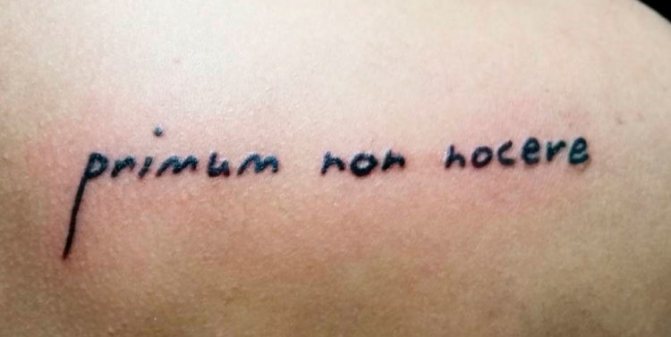

Amantes amentes
Amor caecus
Aquila non captat muscas
"The eagle does not catch flies."
Ars longa, vita brevis.
"Art is eternal, life is short."
Aurea mediocritas.
Aut bene, aut nihil.
"Either good or nothing."
Bellum omnim contra omnes
"War of all against all."
Alea jacta est
"The die is cast," "There is no turning back."
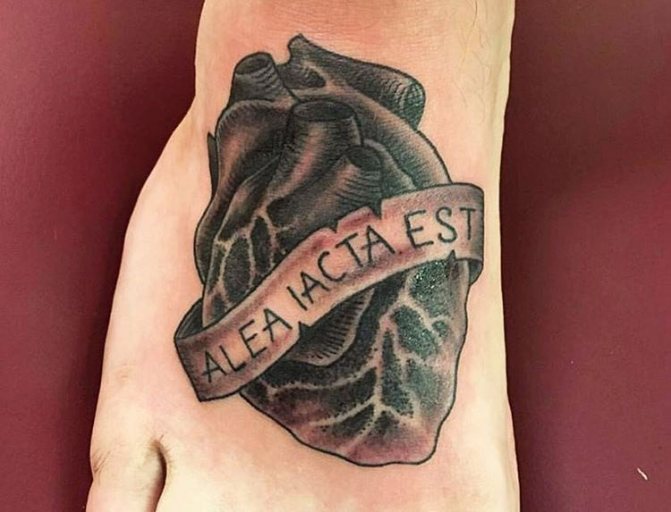

Citius, altius, fortius
"Faster, higher, stronger."
Clavus clavo pellitur
"The wedge is driven out by the wedge."
Contra spem spero
"I hope in spite of hope."
Credo quia absurdum est
"I believe, for it is absurd."
De gustibus non disputandum est
"Tastes are not in dispute."
De mortuis aut bene, aut nihil
"Of the dead, it's either good or nothing."
Debes, ergo potes
"If you must, then you can."
Numera bona tua
"Remember all that is good."


Deus conservant omnia
"God preserves all things."
Dum docemus, discimus
"While we teach, we learn."
Dura lex, sed lex
"The law is harsh, but it is the law."
Educa te ipsum
"Educate yourself."
Errare humanum est
"It is inherent in man to make mistakes."
Experientia est optima magistra
"Experience is the best teacher."
Feci quod potui, faciant meliora potentes
"I have done what I could. Whoever can, let him do better."
Fidem habe
"I have faith."


Festina lente
"The quieter the ride, the farther you ride" (literally: "hurry up slowly").
Ferro ignique
Finis coronat opus.
"The end crowns the deed."
In angustiis amici apparent
"Friends are known when they're in trouble."
In me omnis spes mihi est
"All hope is in yourself."
In vino veritas, in aqua sanitas
"Truth in wine, health in water."
Lux in tenebris.


Mens sana in corpore sano
"A healthy spirit in a healthy body."
Nemo me impune lacessit
"No one will touch me with impunity"
Nihil desperandum
"Never despair."
Noli nocere
Nolite mittere margaritas ante porcos
"Don't cast your pearls before swine."
Non est fumus absque igne
"There is no smoke without fire."
Nota bene
Nusquam est qui ubique est
"He who is everywhere is nowhere."
O tempora, o mores
"O times, O morals."
Omnia mea mecum porto
"I carry all mine with me."
Omnia vincit amor et nos cedamus amori
"All things triumph over love, and we submit to love."
Vulnera et sapientiam
"From suffering to knowledge."
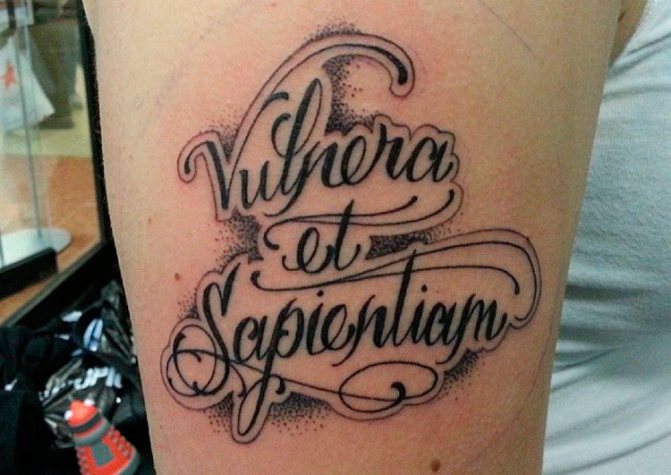

Omnis homo mendax.
"Every man is a liar."
Pacta sunt servanda
"Contracts must be honored."
Panem et circenses
Pecunia non olet.
"Money doesn't smell."
Peregrinatio est vita
"Life is a journey."
Persona grata
"A man of trust."
Potius sero quam nunquam
"Better late than never."
Pro et contra.
Qui non improbat, approbat
"He who is not with us is against us" (literal translation: "he who does not refute, approves")
Quilibet fortunae suae faber.
"Every man is the smith of his own happiness."
Quot homines, tot sententiae
"As many people as there are opinions."
Scientia potentia est
Tertium non datur
"There is no third."
Tale quale
"As it is."
Vi veri universum vivus vici
"By the power of truth, I, who live, have conquered the universe."
The interest in mastering Oriental languages in our fellow citizens has increased just tremendously :_)) But exclusively at the tattooing angle, unfortunately. On the forum, the post about the Sanskrit inscription for tattoos is swelling with comments.
People ask to translate the sometimes utter nonsense. Sonny, who knows Sanskrit, is probably tired of answering, and answers less and less often. I do not know Sanskrit, only a few phrases and words and can read, there are no other people who know Sanskrit on Indonet. If there is so much interest in exotic Devanagari, I thought I should probably write some good expressions. maybe someone will like them. Below is my translation from https://freetranslati. Feel free to do some digging around and see what you can find. Here and now. अत्राधुनC_93E↩ च Live today (in the present) अद्यं जीव Always follow your heart (call of the heart) सदैव तव हृदयमनुगच्छ All you need is love केवलं प्रेम तवावश्यकमस्ति Love yourself आत्मानमनुरज Love this moment क्षणमेतमुरज Happiness Forever (Forever) शाश्वतानंद Live life to the fullest (in the fullness of life) जीवनं संपूर्णता जीव Keep it simple सरलो भव Change the world जगत्परिवर्तस्व Last (only) chance एकांतिमावसरः One life, one chance एक जिंदगी एक मौका God is love ईश्वरः प्रेमास्ति Manage your karma (i.e., be the master of karma (destiny) तव कर्मनियमय Believe in yourself स्वात्मनि विश्वसहि Peace (Rest) is inside, don't look for it outside (elsewhere, outside yourself) शांतिरंतरतः आगच्छति तां बहिर्मान्विष्य I am not this body. शरीरमेतन्ास्मि This too shall pass. चेतदपि गमिष्यामि Time heals all कालः सर्वं विरोपयत Faith, Hope and Love श्रद्धा, आशा प्रेम च If you need to translate a word into Sanskrit, use https://spokensanskri. or https://www.sanskrit-.
Do not write translation requests here For the above reason, if you want to ask, go to another post at the link Sanskrit inscription for tattoo
But if you have something to add, write! I think good maxims and aphorisms in Hindi would be appropriate too.
UPD I started drawing pictures of Hindu and Buddhist mantras, religious symbols, and exotic writings as prints for clothes and stuff. Examples are below. Om Namah Shivaya, my design vision for a trishula and cobra print inscription
